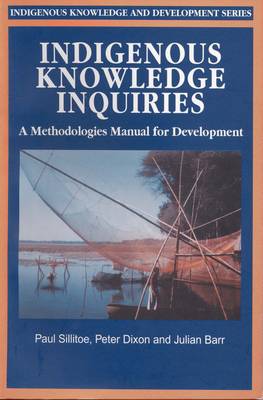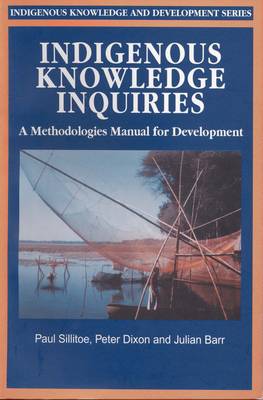
- Afhalen na 1 uur in een winkel met voorraad
- Gratis thuislevering in België vanaf € 30
- Ruim aanbod met 7 miljoen producten
- Afhalen na 1 uur in een winkel met voorraad
- Gratis thuislevering in België vanaf € 30
- Ruim aanbod met 7 miljoen producten
Zoeken
Indigenous Knowledge Inquiries
A Methodologies Manual for Development Programmes and Projects
Paul Sillitoe, Peter Dixon, Julian Barr
€ 50,45
+ 100 punten
Omschrijving
This manual is for development programme managers and project leaders who wish to incorporate an indigenous knowledge element into their work. The guidelines acknowledge that the design and management of IK-informed projects involve making decisions about many closely interrelated issues. They take cost, time and scope of objectives as the principal design issues. The methodology also deals with issues of team functioning that critically inform project success. The guidelines make reference to project cycle management in the context of natural resources indigenous knowledge research, and present options for reducing conflicts and more effectively including the views of primary stakeholders. Novel topics are covered, such as computer aided analysis of qualitative data and the use of cross-cultural research staff. The methodology is grounded in anthropological and development research, and attempts to be critically aware of contemporary reflective practice. Whatever your interest in indigenous knowledge you will find this book a fascinating and insightful handbook.
Specificaties
Betrokkenen
- Auteur(s):
- Uitgeverij:
Inhoud
- Aantal bladzijden:
- 416
- Taal:
- Engels
- Reeks:
Eigenschappen
- Productcode (EAN):
- 9781853395710
- Verschijningsdatum:
- 15/12/2005
- Uitvoering:
- Paperback
- Formaat:
- Trade paperback (VS)
- Afmetingen:
- 163 mm x 233 mm
- Gewicht:
- 544 g

Alleen bij Standaard Boekhandel
+ 100 punten op je klantenkaart van Standaard Boekhandel
Beoordelingen
We publiceren alleen reviews die voldoen aan de voorwaarden voor reviews. Bekijk onze voorwaarden voor reviews.











